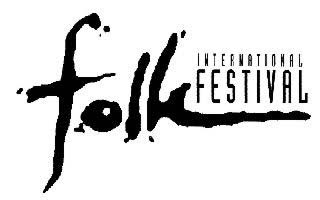
FolkWorld Live Review 03/2000:

FolkWorld presented in the last issue this new festival. The editors have in January made the trip to Tilburg to find out if the festival was worth to present - and it definitely was!
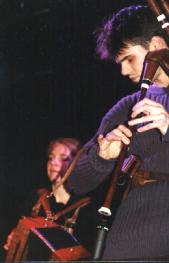 Tilburg is one of the medium sized towns in the south of the Netherlands. It is a nice town,yet without any real touristic highlights - at least it was like that until January 2000, when the first International Folk Festival took place, with an impressive programme and a very professional organisation. With an attractive programme brochure with comprehensive information and a witty and appealing logo for the festival, it became obvious that the organisers put a lot of love into the detail.
Tilburg is one of the medium sized towns in the south of the Netherlands. It is a nice town,yet without any real touristic highlights - at least it was like that until January 2000, when the first International Folk Festival took place, with an impressive programme and a very professional organisation. With an attractive programme brochure with comprehensive information and a witty and appealing logo for the festival, it became obvious that the organisers put a lot of love into the detail.
We only made it to attend the weekend (Saturday and Sunday), missing the first three days of the festival. At these days there was a pub festival with live music in the local pubs, a Brabant (part of the Netherlands) evening and some interesting concerts with a focus on this year's focal country, Hungary.
The weekend part of the festival mainly took part in the 013, a modern venue with two halls, the one big the other one quite small. Music was on in both halls, making the decision between both often not too easy.
The festival's Saturday had the theme 'The Celtic Connections', the Sunday's theme was 'New Folk Adventure'. Both were special and well chosen combinations of highest quality music.
The Celtic Connections evening had for us an unpredicted start, meeting Sarah Allan and Brian Finnegan (half of Flook) in the foyer - they came over from London not as booked musicians but as folk music lovers and paying visitors - says Sarah: "Dervish, Kepa Junkera and La Bottine Souriante all at one evening, that is not easy to find!" And that is 'only' the progamme of the main hall; in the smaller hall BUB presented great fresh instrumental folk music from Flanders, and the new stars of the Celts from the Continent, Shantalla made the hall dancing away.
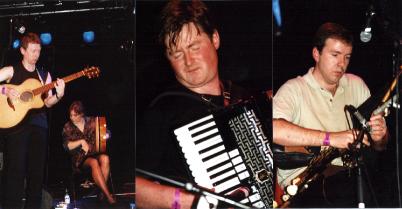 Dervish as an opener - that is quite unusual, more often they are the headliner - indicate the quality of the whole festival. They started the night off with their typical mixture of traditional Irish tunes and songs. Cathy was glad to play the festival: "We are here for three things - to play, to see La Bottine Souriante and to see Väsen - great".
Dervish as an opener - that is quite unusual, more often they are the headliner - indicate the quality of the whole festival. They started the night off with their typical mixture of traditional Irish tunes and songs. Cathy was glad to play the festival: "We are here for three things - to play, to see La Bottine Souriante and to see Väsen - great".
While Dervish were still in full flight in the crowded second hall (BUB) started to play their eclectic mix of excellent tunes, played on bagpipes, accordion, sax, guitar, bass, percussion. This is a band surely to watch out for - they are hot!
Shantalla was the second group in the smaller hall - Irish and Scottish musicians living in Belgium. They have captured already many hearts with their fresh mixture of traditional Irish and Scottish music, and their gig in the small hall had the feeling of a home play for the lads: The hall being overcrowded by a young enthusiastic audience, Shantalla created a terrific intimate atmosphere with their high energy music and song. No doubt that they are the rising stars of the Celtic scene on the continent.
Kepa Junkera from Euskadi (the Basque country) started meanwhile in the big hall, not needing much time to capture the hearts of the listeners. His trikitixa (Basque accordeon) playing is stunningly virtuous and absolutely breathtaking. His melodies are often hymns, appearing again and again in one or even several tunes, staying in your head for hours or even days. Apart from the master of the trikitixa accordion the most unusual part of the band are the two txalaparta players - this Basque percussion instrument is a bit looking like a overdimensional wooden Xylophone. This band is a powerhouse of the best of music!
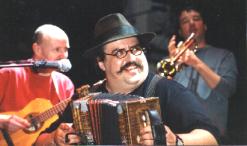 It is hard to follow such a strong band but not for La Bottine Souriante, with their music and stage performance always taking any audience by storm. Their Quebecois humour and their music arrangements with many folk typical instruments (as voice, accordion, guitar, fiddle, foot-percussion, ...) and a breathtaking brass section added by the characteristic singing and lilting of La Bottine's Yves Lambert are these days already legendary in the folk music scene. And as they invited Dervish and afterwards Kepa Junkera back on stage to join them in a number, the show became most special, even more exciting and even more wild...
It is hard to follow such a strong band but not for La Bottine Souriante, with their music and stage performance always taking any audience by storm. Their Quebecois humour and their music arrangements with many folk typical instruments (as voice, accordion, guitar, fiddle, foot-percussion, ...) and a breathtaking brass section added by the characteristic singing and lilting of La Bottine's Yves Lambert are these days already legendary in the folk music scene. And as they invited Dervish and afterwards Kepa Junkera back on stage to join them in a number, the show became most special, even more exciting and even more wild...
After that, the folk music part of the evening was ending. Well but this is a popular venue, and as this is only a first festival, the usual "traditions" of the town may not be broken - so at 12 p.m. sharp suddenly the folkies were surrounded by more and more and more of the more "fashionable" youths of Tilburg, the music from the boxes became at the same time louder and un-folk-ier - it was the usual Tilburg disco time... A strange end of a folk festival evening, and a point where this festival should definitely try to improve next year.
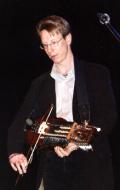 The Sunday concert started already in the afternoon, at 2 p.m. First on in the main hall were Väsen, presenting their cool music tradition from Northern Europe. These Swedes are great instrumentalists - playing percussion (André Ferrari - newest member of the band), guitar (Roger Tallroth), fiddle (Mikael Marin) and one of the most typical instruments for Sweden - the nyckelharpa (Olov Johannson). (Watch out for the interview this issue!) A superb start for a great folk day...
The Sunday concert started already in the afternoon, at 2 p.m. First on in the main hall were Väsen, presenting their cool music tradition from Northern Europe. These Swedes are great instrumentalists - playing percussion (André Ferrari - newest member of the band), guitar (Roger Tallroth), fiddle (Mikael Marin) and one of the most typical instruments for Sweden - the nyckelharpa (Olov Johannson). (Watch out for the interview this issue!) A superb start for a great folk day...
The Czechs of Ceskomor played splendid folk rock music with joyful ballads. Nice to see bands from eastern Europe to come to the bigger folk festvals of western Europe - their music is special but still it is quite seldom seen in the western European folk scene.
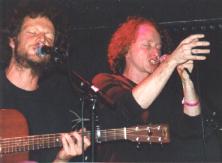 In the smaller hall one of the great exponents of new Flemish (half of Belgium) Folk music played - Ambrozijn. A quartet reminding both in quality and experimentally of the Malicorne experience in those days. Ambrozijn are an acoustic outfit presenting songs in French and Flemish language and fresh, partly self composed tunes, steeped not only in Belgian but in diverse pan-European traditions. All of them are real talents: Ludo van Deau is an emotional and expressive singer with strong voice and much gesture, yet they feature in guitarist Tom Theuns another brilliant singer. The melody section of Wouter Vandenabeele (fiddle) and Wim Claes (accordion, bagpipes) adds impressive innovative tunes to the show. Ambrozijn proved this afternoon that they are one of Europe's best New Folk bands.
In the smaller hall one of the great exponents of new Flemish (half of Belgium) Folk music played - Ambrozijn. A quartet reminding both in quality and experimentally of the Malicorne experience in those days. Ambrozijn are an acoustic outfit presenting songs in French and Flemish language and fresh, partly self composed tunes, steeped not only in Belgian but in diverse pan-European traditions. All of them are real talents: Ludo van Deau is an emotional and expressive singer with strong voice and much gesture, yet they feature in guitarist Tom Theuns another brilliant singer. The melody section of Wouter Vandenabeele (fiddle) and Wim Claes (accordion, bagpipes) adds impressive innovative tunes to the show. Ambrozijn proved this afternoon that they are one of Europe's best New Folk bands.
A band with the name comprising "All Stars" sets high expectations for the listeners. The "Hungarian All Stars" could well cope with these expectations: featuring about a dozen of high class Hungarian musicians of bands such as Vujicsics, Muzsikas, Téka and instruments including Hungarian bagpipes, accordion, flutes, hammered dulcimer, double bass, fiddles, etc., as you can imagine this creates a big sound of pure tradition. As a special bonus there was the magic singing of the famous Márta Sebestyén.
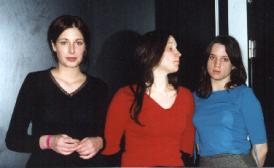 Afterwards followed the much awaited appearance of the new Belgian folk music stars Lais - the three girls with glorious voices. They are singing songs in nearly every European language, but with a strong focus on Flemish songs. First a-capella and later backed by a high profile folk rock band, they showed that they well attract the huge crowds in near future. Watch out for a full feature on the girls in future FolkWorlds.
Afterwards followed the much awaited appearance of the new Belgian folk music stars Lais - the three girls with glorious voices. They are singing songs in nearly every European language, but with a strong focus on Flemish songs. First a-capella and later backed by a high profile folk rock band, they showed that they well attract the huge crowds in near future. Watch out for a full feature on the girls in future FolkWorlds.
All the survivors could after Lais dance the night away to the folk trance music of the Scottish Peatbog Fearies, a great end to a great festival.
The planning of the next festival is already in progress - there will be a focus on Portugal then, and without doubt they will have a lot more attractions to watch out for!
Further infos available at: Tilburg Folk Festival Homepage
To the content of FolkWorld Articles & Live Reviews
To the content of FolkWorld online magazine Nr. 13
All material published in FolkWorld is © The Author via FolkWorld. Storage for private use is allowed and welcome. Reviews and extracts of up to 200 words may be freely quoted and reproduced, if source and author are acknowledged. For any other reproduction please ask the Editors for permission.
